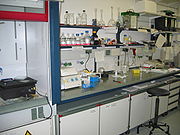
Laboratory equipment
Encyclopedia

Laboratory
A laboratory is a facility that provides controlled conditions in which scientific research, experiments, and measurement may be performed. The title of laboratory is also used for certain other facilities where the processes or equipment used are similar to those in scientific laboratories...
. These include tools such as Bunsen burner
Bunsen burner
A Bunsen burner, named after Robert Bunsen, is a common piece of laboratory equipment that produces a single open gas flame, which is used for heating, sterilization, and combustion.- Operation:...
s, and microscope
Microscope
A microscope is an instrument used to see objects that are too small for the naked eye. The science of investigating small objects using such an instrument is called microscopy...
s as well as speciality equipment such as operant conditioning chambers, spectrophotometers and calorimeter
Calorimeter
A calorimeter is a device used for calorimetry, the science of measuring the heat of chemical reactions or physical changes as well as heat capacity. Differential scanning calorimeters, isothermal microcalorimeters, titration calorimeters and accelerated rate calorimeters are among the most common...
s. Another important type of laboratory equipment is laboratory glassware
Laboratory glassware
Laboratory glassware refers to a variety of equipment, traditionally made of glass, used for scientific experiments and other work in science, especially in chemistry and biology laboratories...
such as the beaker
Beaker (glassware)
A beaker is a simple container for stirring, mixing and heating liquids commonly used in many laboratories. Beakers are generally cylindrical in shape, with a flat bottom. Most also have a small spout to aid pouring as shown in the picture...
or reagent bottle
Reagent bottle
Reagent bottles, also known as media bottles or graduated bottles, are containers made of glass, plastic, borosilicate or related substances, and topped by special caps or stoppers and are intended to contain chemicals in liquid or powder form for laboratories and stored in cabinets or on shelves...
.
Laboratory equipment is generally used to either perform an experiment
Experiment
An experiment is a methodical procedure carried out with the goal of verifying, falsifying, or establishing the validity of a hypothesis. Experiments vary greatly in their goal and scale, but always rely on repeatable procedure and logical analysis of the results...
or to take measurement
Measurement
Measurement is the process or the result of determining the ratio of a physical quantity, such as a length, time, temperature etc., to a unit of measurement, such as the metre, second or degree Celsius...
s and gather data
Data
The term data refers to qualitative or quantitative attributes of a variable or set of variables. Data are typically the results of measurements and can be the basis of graphs, images, or observations of a set of variables. Data are often viewed as the lowest level of abstraction from which...
. Larger or more sophisticated equipment is generally called a scientific instrument
Scientific instrument
A scientific instrument can be any type of equipment, machine, apparatus or device as is specifically designed, constructed and often, through trial and error, ingeniously refined to apply utmost efficiency in the utilization of well proven physical principle, relationship or technology to...
.

